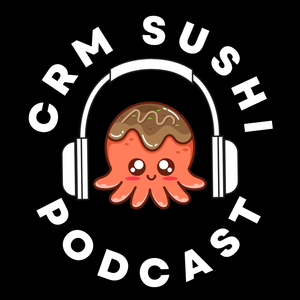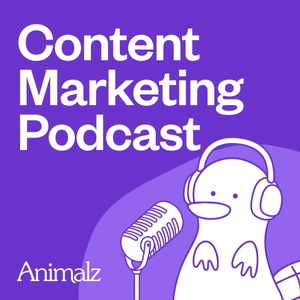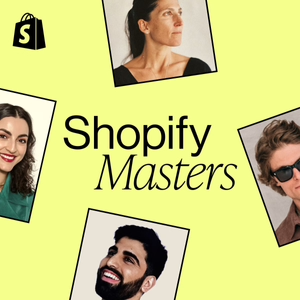
248: The Power of Audio with Audioburst founder and CEO Amir Hirsh
02/24/21 • 30 min
2 Listeners
On this 248th episode of "Marketing Today," host Alan Hart speaks with Amir Hirsh, the chief executive officer and founder at Audioburst. This AI-powered audio discovery platform helps connect content consumers with relevant audio clips.
Our conversation starts with how people have a tendency to call Hirsh crazy due to his innovative and forward-thinking. Hirsh discusses how 2020 acted as gasoline on the audio fire and how "audio connects people much stronger and creates brand affinity." In the last year alone, the podcast industry more than doubled in size as more and more people crave content that doesn't hurl visuals at their eyeballs.
We then dive into Hirsh's company Audioburst and how it has "built an AI engine that listens to that vast amount of content," analyzes, and cuts it into short clips to make it more discoverable on the internet. Hirsh explains the massive opportunities that await marketers who can create or participate in their own audio content, as well as sponsor and attach their name to the audio content of others. The power of audio lies in the fact that "it can pretty much follow you throughout your day without interrupting whatever it is that you're doing at that moment in time." No matter how many people call him crazy, Hirsh sticks to the guiding principle that has gotten him here. "As long as you are true to yourself, you'll be a happier and more contributing person in life."
Highlights from this week's "Marketing Today":
- As an entrepreneur that has spent his life in innovation and forward-thinking, Amir has been called crazy plenty of times. 1:13
- 2020 saw the audio industry explode with more people connecting via audio and technology than ever. 2:20
- Podcasting doubled to 5.5 million podcasts in 2020 alone as more and more time has been spent at home. 2:54
- Consuming content through the ears rather than the eyes frees up the consumer to do so much more. 3:40
- Though Amazon was a little bit late to the audio game, it has positioned itself to be the 800lb gorilla in the room. 4:27
- Voice penetration through Alexa will allow Amazon to push audio content at an entirely new level. 5:36
- It's vital for marketers to think about audio as it becomes more available in all industries. 6:40
- People can connect with brands at a much higher rate through audio than just being bombarded with visuals. 7:10
- If you are not moving your ads into the audio dimension, you miss out on half of the consumers' attention span. 8:00
- Amir started Audioburst to help podcasts and other audio connect with internet searchers. 9:27
- By adding as much metadata as possible to the audio clips, Audioburst makes audio much more discoverable. 11:00
- Other than making it accessible, Audioburst aims to make audio easy to use on many different platforms. 11:42
- Currently, Audioburst partners with the likes of Samsung and Hyundai to integrate into multiple industries. 13:31
- Rather than answering questions with an automated voice, Audioburst provides an audio clip from an expert in that field. 15:15
- Audio finds its power in its ability to follow you around throughout the day without interrupting your activities. 16:44
- Brands and marketers should be open to opportunities both in audio and on audio. 17:56
- Opportunities in audio involve brands and marketers creating their own audio content, whether producing or being interviewed. 18:24
- Placing a brand around a playlist, podcast, or audio event is how brands can participate in audio. 19:28
Hosted on Acast. See acast.com/privacy for more information.
On this 248th episode of "Marketing Today," host Alan Hart speaks with Amir Hirsh, the chief executive officer and founder at Audioburst. This AI-powered audio discovery platform helps connect content consumers with relevant audio clips.
Our conversation starts with how people have a tendency to call Hirsh crazy due to his innovative and forward-thinking. Hirsh discusses how 2020 acted as gasoline on the audio fire and how "audio connects people much stronger and creates brand affinity." In the last year alone, the podcast industry more than doubled in size as more and more people crave content that doesn't hurl visuals at their eyeballs.
We then dive into Hirsh's company Audioburst and how it has "built an AI engine that listens to that vast amount of content," analyzes, and cuts it into short clips to make it more discoverable on the internet. Hirsh explains the massive opportunities that await marketers who can create or participate in their own audio content, as well as sponsor and attach their name to the audio content of others. The power of audio lies in the fact that "it can pretty much follow you throughout your day without interrupting whatever it is that you're doing at that moment in time." No matter how many people call him crazy, Hirsh sticks to the guiding principle that has gotten him here. "As long as you are true to yourself, you'll be a happier and more contributing person in life."
Highlights from this week's "Marketing Today":
- As an entrepreneur that has spent his life in innovation and forward-thinking, Amir has been called crazy plenty of times. 1:13
- 2020 saw the audio industry explode with more people connecting via audio and technology than ever. 2:20
- Podcasting doubled to 5.5 million podcasts in 2020 alone as more and more time has been spent at home. 2:54
- Consuming content through the ears rather than the eyes frees up the consumer to do so much more. 3:40
- Though Amazon was a little bit late to the audio game, it has positioned itself to be the 800lb gorilla in the room. 4:27
- Voice penetration through Alexa will allow Amazon to push audio content at an entirely new level. 5:36
- It's vital for marketers to think about audio as it becomes more available in all industries. 6:40
- People can connect with brands at a much higher rate through audio than just being bombarded with visuals. 7:10
- If you are not moving your ads into the audio dimension, you miss out on half of the consumers' attention span. 8:00
- Amir started Audioburst to help podcasts and other audio connect with internet searchers. 9:27
- By adding as much metadata as possible to the audio clips, Audioburst makes audio much more discoverable. 11:00
- Other than making it accessible, Audioburst aims to make audio easy to use on many different platforms. 11:42
- Currently, Audioburst partners with the likes of Samsung and Hyundai to integrate into multiple industries. 13:31
- Rather than answering questions with an automated voice, Audioburst provides an audio clip from an expert in that field. 15:15
- Audio finds its power in its ability to follow you around throughout the day without interrupting your activities. 16:44
- Brands and marketers should be open to opportunities both in audio and on audio. 17:56
- Opportunities in audio involve brands and marketers creating their own audio content, whether producing or being interviewed. 18:24
- Placing a brand around a playlist, podcast, or audio event is how brands can participate in audio. 19:28
Hosted on Acast. See acast.com/privacy for more information.
Previous Episode

247: Forget 2020? Party City and Julie Roehm have made the best of it and more
On this 247th episode of "Marketing Today," host Alan Hart speaks with Julie Roehm, the chief marketing and experience officer at Party City. More than most, Party City had to make a massive pivot in response to the pandemic, as parties became all but outlawed.
We start our conversation talking about Roehm's unusual path to where she is today, actually beginning with a degree in environmental engineering before moving to finance and ultimately marketing. Roehm then explains how each industry taught her to view challenges "as opportunities rather than an obstacle." Next, Roehm dives into the beginning of her marketing career at Ford Motor Company, stating, "that's where I started to get the taste for this out-of-the-box, different way of thinking about marketing." As she made the jump from company to company, Roehm stayed true to her No. 1 rule, "culture eats strategy for lunch."
We then discuss the challenges presented by the pandemic to her current company, Party City, during a time when "pandemic and party were not synonymous." Roehm explains how she was able to set up a same-day delivery service with Hertz in just eight days as her team made an attempt to "get people to see celebration around every corner." People need something to be happy about during the pandemic, and Party City is trying to give it to them. Finally, Roehm talks about the importance of knowing "yourself and the kind of environments you're going to thrive in!"
Highlights from this week's "Marketing Today":
- Julie created The Conversational Podcast in her free time after she successfully flipped an auto body company. 1:27
- Throughout her career, Julie has been able to know some incredibly successful people on a personal level. 2:26
- Julie's Holy Shit moments have given her direction throughout her life, leading to her greatest success. 3:18
- Born in the Midwest as the oldest child, Julie's family moved around a lot before attending Purdue for college. 5:22
- Upon finding out that engineers were paid well, Julie decided to go into engineering at Purdue. 6:26
- After her first year in college, Julie chose civil engineering to buy more time to figure out what she wanted to do. 7:00
- Julie ultimately chose environmental engineering and being accepted into a co-op program. 8:36
- During her time in the co-op program, Julie learned that she did not want to be an engineer, but she did want to be a businesswoman. 9:10
- Once she began attending business school in Chicago, Julie worked for American Airlines as an intern in the New Business and Marketing area. 9:55
- Julie ultimately chose to work in marketing for Ford Motor Company right out of business school. 11:05
- Back in 1999, Julie helped launch the first Ford Focus in the United States. 11:36
- After Mercedes bought Chrysler, Julie made the jump and created the Grab Life by the Horns campaign. 12:00
- Spending under a year at Walmart, Julie decided to start her own consulting company that lasted for five years. 12:56
- Julie was excited to work as CMO for Abra Autobody & Glass because of the incredible culture that had been built. 14:00
- After flipping Abra, one of the board members extended an offer to Julie to come to Party City. 15:50
- Before agreeing to join Party City, Julie made sure to spend time with the executive board to make sure the correct culture was there. 16:33
- With enough skills, training, and confidence, you can do anything, but the culture will be what ultimately launches you to success. 18:10
Hosted on Acast. See acast.com/privacy for more information.
Next Episode

249: What Radicalization Means to a Brand Marketer with Yonder CEO Jonathon Morgan
On this 249th episode of "Marketing Today," host Alan Hart speaks with Jonathon Morgan, the founder and CEO of Yonder, an AI company that helps Fortune 500 communication teams identify and counteract online disinformation about issues that matter to their organization.
In this episode, Morgan talks about the power of groups with extreme ideals and how thought radicalization can mean something different for marketers.
Our conversation starts with understanding Yonder's mission and how the company originated. Early in his career, Morgan conducted internet research, advising the state department on how they could counter the impact of online radicalization worldwide.
Morgan explains that the modern concept of the internet is based on a fundamental premise — "there is wisdom in the crowd." He soon found out, however, that "if you value crowds, you inadvertently value mobs," and that someone who manipulates social platforms can have an immeasurable amount of power in swaying the crowd's thinking.
From there, Morgan provides insights on the pros and cons of social media censoring and how easily misinformation and extremist ideals can leak into mainstream media. Finally, he talks about how the idea of radicalization isn't always a bad thing when it comes to brand marketing.
In this episode, you'll learn:
- The vulnerability of the internet and our social ecosystem
- What contributes to the origins of radical groups and how misinformation can spread
- The difference between good and bad radicalization
- The importance of authentically communicating your company's values
- How to build a coalition for your brand and leverage communication better
Key Highlights:
- [02:16] Yonder's mission and how they got started
- [05:46] How a person can have an incredible influence on the way the public thinks
- [07:44] Motivations behind a mob; looking at the riots on the Capitol
- [11:17] The pros and cons of censoring on social platforms
- [15:21] How radical ideals spread into mainstream media
- [18:40] When radicalization isn't always a bad thing
- [24:00] Jonathon's advice to brand marketers about building a network
- [32:53] How taking a stand is complicated but essential
- [35:02] An experience that defines Jonathon made him who he is today
- [36:27] Jonathon's advice to his younger self
- [37:38] An impactful purchase Jonathon has recently made
- [41:15] The brands, companies, and causes Jonathon follows
- [42:38] What Jonathon thinks is the biggest opportunity for marketers today
Resources Mentioned:
- Yonder
- Jonathon Morgan - CEO of Yonder, his personal site
- The prior episode on Marketing Today with Lisa Roberts, CMO at Yonder
- 4Chan (Wikipedia)
- QAnon (Wikipedia)
Hosted on Acast. See acast.com/privacy for more information.
If you like this episode you’ll love
Episode Comments
Featured in these lists
The best podcasts for Marketers!
Curated by Brian Hurst
Generate a badge
Get a badge for your website that links back to this episode
<a href="https://goodpods.com/podcasts/marketing-beyond-with-alan-b-hart-19836/248-the-power-of-audio-with-audioburst-founder-and-ceo-amir-hirsh-12054041"> <img src="https://storage.googleapis.com/goodpods-images-bucket/badges/generic-badge-1.svg" alt="listen to 248: the power of audio with audioburst founder and ceo amir hirsh on goodpods" style="width: 225px" /> </a>
Copy




